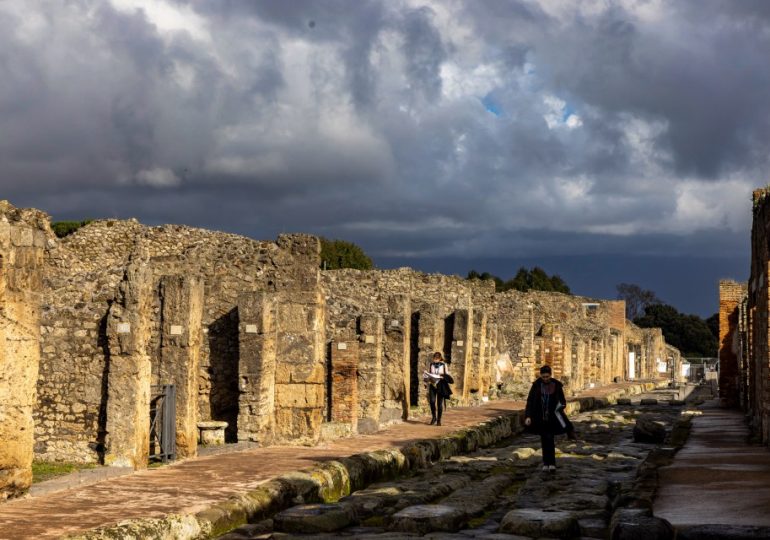A CHILLING note from a victim of the Pompeii “curse” reveals the shock diagnosis she received months after stealing pumice stones from the archaeological site.
In a handwritten letter, the anonymous woman said she now has breast cancer and “didn’t know about the curse” when taking the artefacts.
GettyA woman claims she has been ‘cursed’ after stealing rocks from the site of Pompeii[/caption]
twitter/@GZuchtriegelIn a written letter, she reveals she was diagnosed with breast cancer within a year of her theft[/caption]
The young tourist had been enjoying a holiday in southern Italy when she stole the stones – only to be “cursed” within a year of her visit.
In the letter, she wrote: “I didn’t know about the curse. I didn’t know that I should not take any rocks.
“Within a year, I got breast cancer. I am a young and healthy female, and doctors said it was ‘just bad luck’.
“Please accept my apology and these pieces,” the tourist added, before signing off the letter with “I’m sorry” in Italian.
The haunting revelation was revealed by Gabriel Zuchtriegel, the director of Pompeii’s archaeological park, after both the letter and stones were returned inside a package.
He shared a picture of the letter and the returned artefacts on X and wrote: “Dear anonymous sender of this letter, the pumice stones arrived in Pompeii. Now good luck for your future.”
The archaeologist then spoke about the incident to RaiNews24, describing the woman’s letter as “very touching” according to the Daily Mail.
He said: “We responded to the lady who wrote to us because her letter is very touching but I remember it: stealing goods from archaeological sites is a crime and we must report everything to the authorities.”
Zuchtriegel later revealed that hundreds of apologetic letters are received from tourists who site a “curse” after stealing artefacts from Pompeii.
He continued: “Many people write to us about the alleged curse and tell us about the misfortunes they have suffered at work, in illness: these are touching and sad things.
“Many write returning objects stolen when they were children, these are thefts that occurred decades ago.”
Zuchtriegel said “it makes no sense to take these objects away”, before adding: “We also monitor the site with video surveillance, but the site is large and it could happen that something is stolen.”
In 2020, a Canadian woman returned two mosaic tiles she had snatched from Pompeii, along with parts of an amphora and a piece of ceramics, following 15 years of bad luck.
After stealing the artefacts in 2005, Nicole, as she was identified, revealed in a letter that she had endured two cases of breast cancer and financial hardship following her theft.
“Please, take them back, they bring bad luck,” she said, before adding they had “so much negative energy… linked to that land of destruction.”
“I am now 36 and had breast cancer twice,” the letter continued. “The last time ending in a double mastectomy.
“My family and I also had financial problems. We’re good people and I don’t want to pass this curse on to my family or children.”
Nicole cited “wanting to own a piece of history that no one else had” as he reason for stealing.
Also included in the returned package was another letter of confession from a couple in Canada.
They detailed their regret at stealing artefacts in 2005 without consideration for those who had suffered at the site all those thousands of years ago.
Located near the coastal city of Naples, Pompeii was buried under meters of ash and pumice after the catastrophic eruption of Mount Vesuvius in 79 A.D.
Last month, a man was left stunned after finding out a tatty stone souvenir in his family’s basement was a priceless 2,000-year-old relic from Pompeii.
Police knocked on Geert De Temmerman’s door shortly after he requested a valuation for the broken marble artwork online.
And in October, researchers used artificial intelligence to help them decipher a 2,000-year-old scroll unearthed from the ashes of Mount Vesuvius.
The rolled-up papyrus was excavated from the ancient Roman city of Herculaneum in the 18th Century.
GettyHundreds of apologetic letters are received from tourists who site a “curse” after stealing artefacts from Pompeii[/caption]
Leave a comment








